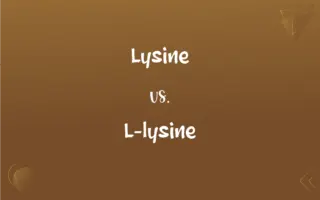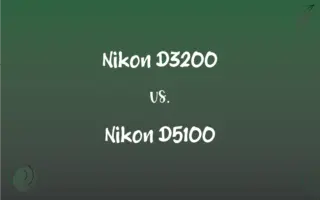Crack vs. Fissure: What's the Difference?
Edited by Aimie Carlson || By Harlon Moss || Published on January 10, 2024
Crack is a narrow break or split in a surface. Fissure is a long, narrow opening or line of breakage.

Key Differences
A crack is typically a small or fine breakage in a surface. It is often irregular and can occur in various materials like glass, wood, or concrete. On the other hand, a fissure is generally a more extended and deeper split or opening. Fissures are usually associated with geological formations, like in rocks or the earth, indicating a more significant separation than a crack.
The word 'crack' can also imply a sudden, sharp sound, often associated with the breaking of something. Fissure, in contrast, doesn't have a connotation related to sound but is more about the physical formation, often observed in medical or geological contexts.
In a metaphorical sense, a crack can represent a small weakness or flaw in a system or plan. Fissure, metaphorically, might suggest a more significant division or split, often used to describe issues in relationships, organizations, or social structures.
The term 'crack' can be used in various contexts, from everyday language describing minor damage to materials to specialized fields like engineering. Fissure tends to be more specialized, often used in technical fields like geology, medicine, and architecture, indicating a specific type of split.
In everyday speech, 'crack' can also imply a try or attempt at something, as in "give it a crack." In contrast, 'fissure' does not have such diverse colloquial uses and retains its more specific, technical meaning in most contexts.
ADVERTISEMENT
Comparison Chart
Size and Depth
Usually smaller and less deep
Longer and deeper
Contexts
Common in everyday language, materials, sounds
More technical, often geological or medical
Metaphorical Use
Small flaws or weaknesses
Significant divisions or splits
Usage
Wider, including colloquial expressions
More specialized and technical
Sound Connotation
Associated with a sharp sound
No sound connotation
ADVERTISEMENT
Crack and Fissure Definitions
Crack
A small space between two surfaces.
Light shone through the crack in the door.
Fissure
A deep division or separation.
A fissure in the ice made it dangerous to cross.
Crack
A sudden, sharp noise.
The crack of the bat hitting the ball echoed in the stadium.
Fissure
A long crack in a building or structure.
They found a fissure in the ancient cathedral's wall.
Crack
To cause something to split.
The vase cracked when it hit the floor.
Fissure
A crack in the earth's crust.
Geologists studied the fissure created by the earthquake.
Crack
A small defect or flaw.
There was a small crack in his otherwise perfect demeanor.
Fissure
A long, narrow split or opening.
A fissure appeared in the rock wall.
Crack
Informal term for an attempt.
I'll have a crack at solving the puzzle.
Fissure
A deep groove in body tissue or organ.
The doctor examined the fissure in the patient's skin.
Crack
To break without complete separation of parts
The mirror cracked.
Fissure
A long narrow opening; a crack or cleft.
Crack
To break or snap apart
The branch cracked off and fell.
Fissure
The process of splitting or separating; division.
FAQs
Can 'crack' be used metaphorically?
Yes, to describe a small flaw or weakness.
Is 'fissure' used in everyday language?
It's more common in technical fields like geology or medicine.
Are cracks always smaller than fissures?
Generally, yes. Cracks are usually smaller and less deep compared to fissures.
Do fissures only occur in geological contexts?
No, they can also refer to divisions in other contexts, like in buildings or in medical terminology.
Are fissures dangerous?
They can be, especially in geological or architectural settings.
Does 'fissure' have a colloquial use?
It's mostly used in a technical or formal context.
Is the term 'crack' used in medical contexts?
It can be, but less frequently compared to 'fissure'.
Can the term 'crack' refer to a sound?
Yes, it can describe a sharp sound, like the crack of a whip.
Can a crack develop into a fissure?
In some cases, yes, especially in geological formations.
Can a crack indicate a serious problem?
Yes, especially if it's in structural elements like buildings.
Are cracks repairable?
Often, yes, depending on the material and the extent of the crack.
Are fissures always visible?
Not always; some may be internal, like in geology or medicine.
Can a fissure indicate an upcoming earthquake?
It can be a sign of geological activity, potentially including earthquakes.
Does a fissure imply a complete break?
Not always; it's more about a significant, long split.
Can cracks emit sounds naturally?
In some cases, such as ice cracking, they can.
Are fissures common in the human body?
They can occur, often referred to in medical diagnoses.
Do fissures occur in art or design?
Rarely, unless it's a deliberate part of the design.
Do cracks affect the value of objects?
Yes, especially in art, antiques, or real estate.
Can the weather cause cracks?
Yes, temperature changes can cause materials to crack.
Is it easy to fix a crack?
It depends on the material and severity of the crack.
About Author
Written by
Harlon MossHarlon is a seasoned quality moderator and accomplished content writer for Difference Wiki. An alumnus of the prestigious University of California, he earned his degree in Computer Science. Leveraging his academic background, Harlon brings a meticulous and informed perspective to his work, ensuring content accuracy and excellence.
Edited by
Aimie CarlsonAimie Carlson, holding a master's degree in English literature, is a fervent English language enthusiast. She lends her writing talents to Difference Wiki, a prominent website that specializes in comparisons, offering readers insightful analyses that both captivate and inform.




































































